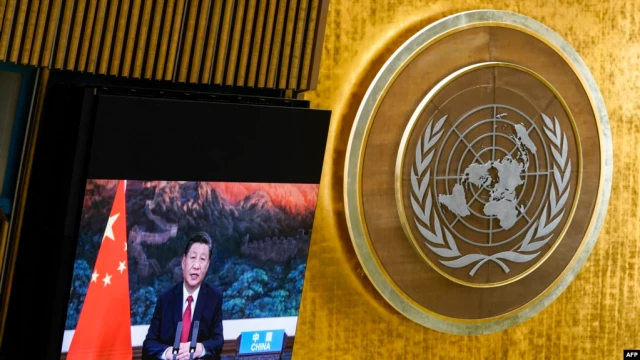China Vows to Stop Building Coal Plants Overseas, But What Does That Mean?

- By Voice of America
- September 28, 2021 1:38 PM
SEOUL, SOUTH KOREA —When Chinese President Xi Jinping last week announced his country will stop building coal power plants overseas, environmental activists were jubilant.
It’s easy to see why. China is a major financial backer of coal-fired power plants around the world, which emit greenhouse gases that cause climate change.
With China’s announcement, all the world’s top economies have now committed to ending state-backed financing for overseas coal plants. South Korea and Japan made similar commitment to end financing coal earlier this year.
Many hope the move will create momentum ahead of November’s United Nations conference in Glasgow, Scotland, where governments will negotiate new climate change commitments.
“It is clear the writing is on the wall for coal power,” declared Alok Sharma, a British politician organizing the U.N. conference.
Not all climate experts are so confident. That’s because Xi’s promise, made during a speech Tuesday at the U.N. General Assembly, was brief and has not yet been translated into concrete policy.
Here are some of the biggest questions about Xi’s announcement:
When will China's new rules take effect?
Xi’s speech did not specify when Beijing would stop building coal power plants overseas. He also did not say whether the new rules would apply immediately or be phased in. Those factors could be crucial for many China-funded coal projects currently underway, since the plants typically have a lifespan of several decades.
“The Chinese government will face a lot of resistance within China from coal interests opposed to restrictions on their market,” says Christine Shearer, program director for coal at Global Energy Monitor, which documents fossil fuel projects worldwide. “However, we also know that when the Chinese government decides to do something, it can do it more swiftly and broadly than most countries in the world.”
China had already been phasing out some of its overseas coal involvement. China’s Belt and Road Initiative, which has helped build coal plants in countries ranging from Turkey to Vietnam, did not fund any coal projects for the first six months of this year.
Part of the reason for China’s shift, many analysts say, is the considerable domestic opposition to the pollution-causing coal plants in various countries, as well as the plunging prices of renewable energy sources, such as solar and wind farms.
“In over half the world, it is cheaper to build new solar photovoltaic or wind generation capacity than to keep existing coal-burning units operating — a trend projected to cover 100% of markets within the decade,” says Shearer.
Will China’s private investment in coal also end?
It is not clear whether Xi’s announcement covers only public financing, or if the country’s commercial banks will also be restricted from involvement in overseas coal projects.
One possible clue came Friday, when the Bank of China, a state-owned commercial bank, said it would stop providing financing for new coal mining and coal power projects overseas starting next month.
“If Xi’s pledge includes China’s commercial banks too, this is much more ambitious than anything the West has done,” tweeted Kevin Gallagher, director of the Boston University Global Development Policy Center.
But such a move would be challenging, says Judith Shapiro, a sustainable development expert who teaches at American University’s School of International Service.
“The central government does not fully control what various Chinese-funded entities choose to do overseas, especially when they are driven by profit rather than geopolitical reputational considerations,” Shapiro says.
Another factor: many Chinese construction companies build coal plants overseas using financing from outside China, according to a recent academic article. It’s not clear whether Xi intends to also ban projects using such arrangements.“So, when Xi said ‘build,’ we'll have to see if he meant this,” tweeted one of the article’s authors, Cecilia Han Springer.
Will China end its coal addiction at home?
China may be phasing out its involvement in coal projects abroad, but it’s another story at home, where China relies on coal to produce the bulk of its electricity.
The numbers are staggering. China burned over half (53%) of the coal used in the world in 2020, according to an estimate by Ember, a London-based research group.
It may not get better anytime soon, since China’s coal power plant construction continues to outpace the rest of the world. “In 2020, China built over three times as much new coal power capacity as all other countries combined — the equivalent of more than one large coal plant per week,” according to a report published by the Helsinki-based Centre for Research on Energy and Clean Air.
Unlike many other countries, the coronavirus pandemic hasn’t provided even a temporary emissions reprieve for China. That’s because many Chinese provinces have used coal projects to stimulate their economies during the pandemic-induced economic slowdown, says Global Energy Monitor.
“The economic challenges due to COVID have increased pressure to maintain jobs and profits,” says Shapiro, the American University professor. “The transition away from coal is expensive, and these are costs that China is struggling to bear at this moment, given that there is a bountiful supply of coal available within the country.”
Those trends help explain why China was the world’s only major world economy to see an increase in greenhouse gas emissions in 2020.
They also raise questions about China’s ability to meet its promises of reaching peak emissions in 2030 and to become carbon neutral by 2060.















